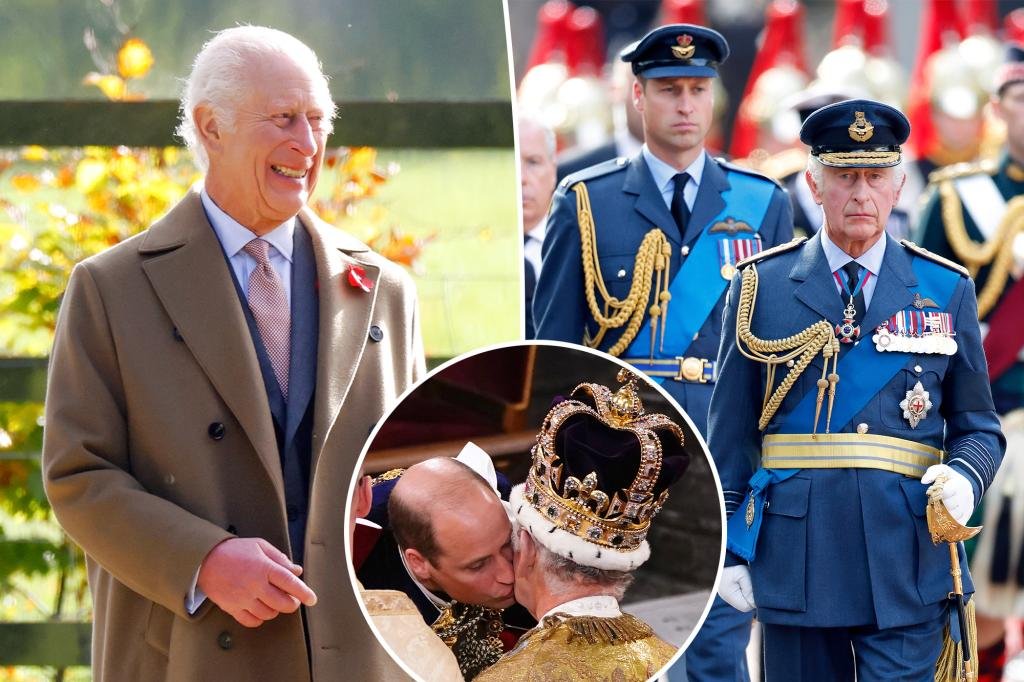
King Charles and Prince William’s respective private estates have been cashing in on eye-popping sums of money each year, rinsing charities and public services in the UK of millions, an investigation has found.
An investigation led by The Sunday Times and broadcaster Channel 4 looked into the Duchy of Lancaster and the Duchy of Cornwall — the estates owned by the monarch, 75, and his eldest son, 42.
On Saturday, Channel 4 aired the documentary, titled “The King, the Prince & Their Secret Millions,” in which they published a series of shocking findings about the two tax-exempt estates.
The following day, The Sunday Times published documentation supporting the findings.
Among the myriad of allegations, it was found that Charles and William’s private estates have been taking millions from public bodies, including the National Health Service, state-funded schools, and the British Armed Forces.
The Duchy of Lancaster is an estate owned by the cancer-stricken sovereign. It includes vast acres of land, properties, and assets across the UK and dates back to the 14th century.
Similarly, the Duchy of Cornwall is an estate that provides an income for the heir to the throne.
The Prince of Wales inherited the estate — which is worth over $1 billion — when his father assumed the throne in Sept. 2022.
Both estates are exempt from paying corporation tax or capital gains tax.
The program alleged that William’s estate has claimed over $28.5 million since 2005 from a share of rent payments on Camelford House, as well as a $78,000 payment from St John’s Ambulance — a charity of which Charles is a patron.
Back in June, William was seen paying a visit to the MI6 headquarters — located in central London next to Camelford House. At the time, no one knew the nature of his visit.
What’s more, the report claimed that the king’s estate last year signed on a dotted line to store a new fleet of electric ambulances in its warehouses in exchange for $14.7 million over 15 years.
In addition, William’s estate had charged the British Navy $1.3 million since 2004 to build jetties and moor warships in Cornwall.
Other findings include that the royals charge a fee for the right to cross rivers and run cables under the beaches they own.
They also earn passive income from tolls, parking lots, and wind turbines, the investigation found.
The doc also included a series of examples showing that William’s estate clashed with the values laid out in his Earthshot Prize.
The campaign, founded by the future king in 2020, focuses on highlighting efficient ways of preserving the planet.
The findings also revealed the duchy’s $48 million deal to lease Dartmoor Prison, located in England, to the Ministry of Justice.
Both estates have raised around $65 million through deals made in the past year, the doc adds.
In response to the investigation, a Duchy of Cornwall spokesperson told The Post, “The Duchy of Cornwall is a private estate with a commercial imperative which we achieve alongside our commitment to restoring the natural environment and generating positive social impact for our communities.
“Prince William became Duke of Cornwall in September 2022 and since then has committed to an expansive transformation of the Duchy.”
“This includes a significant investment to make the estate net zero by the end of 2032, as well as establishing targeted mental health support for our tenants and working with local partners to help tackle homelessness in Cornwall,” they added.
The Post has reached out to Buckingham Palace for comment.
Earlier this year, William’s eye-popping $30 million salary was revealed. He received the income from his Duchy of Cornwall estate during the 2023-2024 financial year.
The Integrated Annual Report revealed a $30.4 million surplus for the 2023-2024 financial year, as well as William’s new Duke of Cornwall title.
However, the father of three raised eyebrows by refusing to reveal what he paid in taxes for the 2023-2024 financial year — breaking his father’s tradition that spanned more than 30 years.


Recent Comments